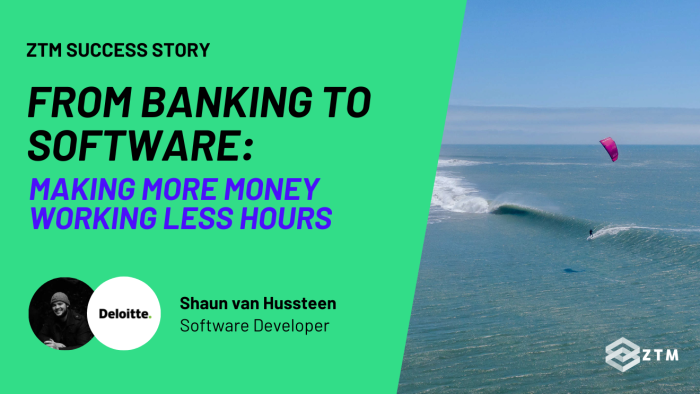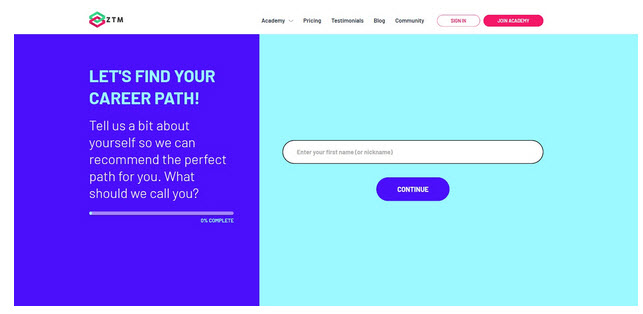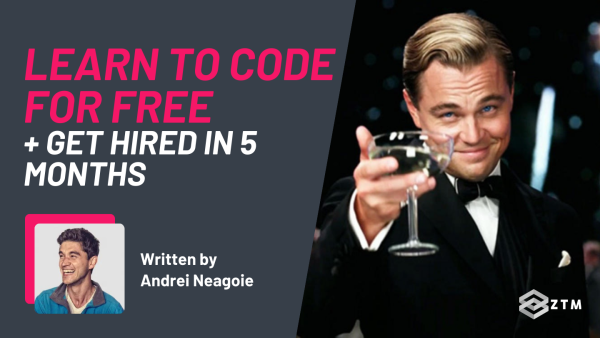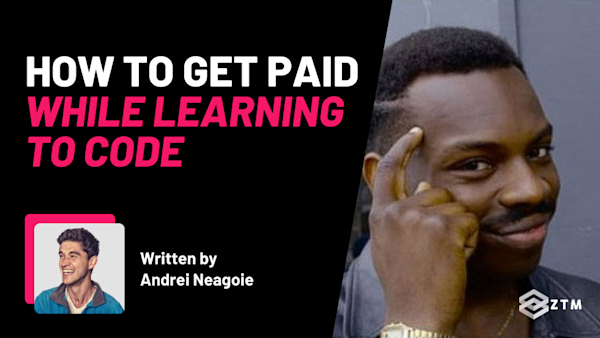Some jobs just look better on paper than in reality. They may pay well, but if it’s 12-14 hour days with high stress and a lot of sacrifice, well… you might start thinking of better options.
That’s exactly what one of our students decided to do, and within 6 months of joining ZTM, Shaun secured a new job with better pay, less hours, and altogether a better lifestyle.
Here’s how he did it…
Meet Shaun

Hi there! I’m Shaun van Hussteen, I’m a Senior Consultant at Deloitte, and I work as a Software Developer.
I come from a financial background and worked at a bank for the past 6 1/2 years before I got my new role. During that time I was focused on management starting in analysis, then project management, moving onto operational management, and then finally ending up in automation or ‘machine’ management.
There were a lot of perks but also a lot of sacrifices. I found that working in that particular area in the banking industry was all work and no play, so I decided to make some lifestyle choices and become a Software Developer. It took me a few years to get here, but it’s a wonderful change!
How and why did you change your lifestyle?
I used to live in Johannesburg which is where you ‘go to work’ because it's the financial hub, but that's pretty much all you do there. Honestly I’ve never met anyone who goes there for a holiday!

The biggest change so far is that I moved from there to Cape Town, which is a beautiful place to live.
It’s the place to be if you want more of a fun or active lifestyle. There are wineries, you can go kitesurfing, the sun comes up early and sets later so you have longer days for activities, so it's completely different to the big city.
If you go to the beach on the right day, you’ll see the horizon filled with kites, with people doing somersaults and other crazy stuff. In fact, there was a Red Bull kitesurfing event here just last weekend.

Now that I live here, I can get back into scuba diving, take my Master diving certificate, and learn to kitesurf!
That’s the beauty of tech jobs right? You have so much more freedom and autonomy, that you can pretty much set your own hours as long as you get the work done, while also getting paid well.
How long have you been in your new role as a Software Developer?
Literally only 3 months, so I’m still really new to it, but I’m having an absolute blast!
I think I’ve learned more in the past 3 months doing the actual work of Software Development and building out websites, then I have in a year and a half of trying to figure it all out on my own or online.
Editor’s note: That’s why we structure our courses in the way that we do. In reality, each course could be hundreds of hours long, with thousands of examples, but the thing is, you don’t need to know all that to do your job.
It’s the 80/20 rule. What’s the 20% that you need to know to do 80% of the work? Because if you can learn that, then you can get hired right away. That’s not to say we skimp on content. In fact, most employers are shocked by the scope of ZTM students' portfolios.
The fact is though, that we want you to get hired quickly. Anything you need to know extra for your job, you’ll pick up once you start, and this is true for any new job. Even if you’ve been coding for years, there's always a learning curve of specific things for each company.
How has it been in those first 3 months? Most new coders describe it as a ‘baptism by fire’, but what was your experience?
Ha absolutely! One of the big things that helped me, is that I have some previous experience that crossed over, so that really worked out in my favor. Thanks to all that management work, I’m not losing my mind if I have to go to meetings or manage my time, because I’ve done all that before.
With the Software Development side though, I have to say that I spend most of my time doing things such as debugging and figuring out why things are not working on one particular system or browser, but is fine on others etc.

That being said, it’s a lot of fun. If you enjoy problem solving and creative pursuits, then it’s actually wonderful fun. You are NEVER bored, I can promise you that 😃.
One problem though is that it’s so easy to get caught up in imposter syndrome, and it’s 100% a real thing and you will definitely feel it. In fact, I think it’s something that you probably go through for the rest of your life as a competent Software Developer.
If you think about it, you never really know what you’re doing. You have a level of expertise, but you’re almost always (at least in the early days) doing something brand new, so you can’t know all the answers.
In fact, it’s far more important to learn how to adapt and trust yourself to figure it out. I talk to Senior Software Developers and they all say the same thing. All that really happens is you just get better and faster at learning, and feel more comfortable figuring things out.
Also? You’re never figuring this all out on your own. It’s a team effort and if you ask for help, you’ll get it. I’ve been chatting to a bunch of Senior Developers and Engineers for mentorship and they all want to help me out. Everybody at all levels feel the same struggle, and it’s a journey we’re all on.
Honestly, my biggest struggle right now is simply estimating how long something will take! There’s no substitute for experience.
Editor’s note: If you're in an industry or profession with a lot of growth, you really can’t know everything. Learning to embrace that fact, fail fast, and figure stuff out is almost as important as learning to code on its own. It’s why we teach this life skill and a few others.
The key is that you don't make the same mistakes twice.
Once you can embrace the mindset of learning as you go, and figuring things out, you’ll get an amazing sense of calm.
What was the outcome you were hoping for, when you decided to join ZTM, and do you feel like you’ve achieved it?
Ok so let me preface this first with some context.
For the last 3 years or so, I’ve tried to get into Software Development because my previous role was incredibly stressful, with a lot of time investment and responsibility. I saw it as a way to change my lifestyle and life, reduce stress and earn similar money.
My goal was to get this job so yes, I would say that I have happily achieved it!
But back to my path to get here…
In the beginning I watched so many Youtube tutorials, and they were super helpful and valuable, but I got stuck in tutorial hell.
I was just doing one after another with no real structure or path of what to do or where to go, and I didn't know what I actually needed to learn.
I was doing all these small projects but because everything was so segmented, I didn’t have a cohesive plan.
For example
Let’s say that you wanted to build a website. You might know a bunch of things and how to create specific parts, but you’ve never built from start to finish, so you don’t know where to start.
I knew I needed something with more structure, so I went to Udemy and bought a lot of courses there. It was better in a lot of ways, but there were still similar problems.
So many creators make similar courses and have no real structure or career path. Also, the courses often try to prepare you for every possible eventuality, so it's a lot of overwhelm and learning things that you don’t really need to know. You end up bombarded with information and sometimes, it’s not only not relevant, but not even up to date.
Other times you run the risk of finding content from smaller course creators who might share information that’s no longer correct. Or, maybe they are up to date and the teacher is a great Software Engineer, but they’re not great at teaching and so it all leaves a little to be desired. Sometimes it’s a 60 hour course, and by hour 20 you’re thinking, “when am I going to learn what I need to know?” and so you end up bailing on the course.

Whereas at ZTM, the experience is really efficient.
You can tell a lot of effort went into creating the courses, and organizing the information. I would have to say that ZTM’s biggest hook or selling point is that you get us where we need to go, in the fastest amount of time, and in a fun way.
You also talk about the reasons behind whatever we’re doing or learning which is huge, instead of just telling you to do something but never knowing why.
When did you first realize that you needed a more cohesive training program?
Like I said above, I was just stuck in endless tutorial hell. Youtube was free and Udemy was cheap, but it never felt there was a structure.
Because you had tried some other platforms before, did you have any doubts or fears before joining ZTM?
Yes but I think that was mainly due to the price point. I know you guys (ZTM) are still fairly cheap, but it feels like it’s also just enough money to make you take action.
I had to ask myself, was I ready to fully commit to this and make it happen? Am I ready to put some skin in the game?
I trusted the content would work, but it was mainly my own thoughts of whether I would make excuses or instead find the time to get it done.
At this point I was doing 12-14 hours a day at work, so I had to make sure I had the willpower to get an hour of learning / coding done after a long day at work.
Ironically, those long days probably forced me to get it done so that I could stop doing them!
Did you have any difficulties after you joined ZTM?
Not really no. Well, nothing that you wouldn’t expect. The courses were all great and up to date, and the support helped. It was mainly just the learning curve etc. It’s not like the Matrix where you can just start to see everything in code and understand it overnight!

So mainly just growing pains. Figuring out how the ZTM platform worked as a new student (not that it wasn't clear but just getting used to it), learning what everything meant in courses, applying myself etc.
How did you land your first coding job?
Technically, I actually started working on some Salesforce programming with my banking company before I got my current permanent role.
I had finished ZTM’s React and Next.js courses, and people at work found out and said I was welcome to apply for a coding training program within the bank. Thanks to the projects in the course I had created on my Github profile which sold them on me joining.
I smashed through the 2 certifications for that in 2 months and worked on a language called Apex which is very similar to Java. But because I had done the ZTM work first, it was really easy for me to learn.
By around 6 months I had completed all the internal certificates with that language, but I was still working in my managerial role and looking for coding jobs internally within the bank, but nothing had come up yet.
Then in May 2022, I grew tired of not being able to find any internal opportunities and so I posted on my Linkedin profile that I was looking for a new job and updated my profile with my certificates.

Within 2 weeks I was getting daily calls from recruiters trying to find me roles. I think the fact that I had in demand language skills, mixed with niche language knowledge and a financial background all helped fast track me.
Editor's note: This is the beauty of "skill stacking". No matter what your career journey has been to this point, you definitely have unique skills that you've acquired.
Stacking those skills with programming skills typically makes you stand out from people who come from fancy Computer Science schools who you might think you have no chance against. Also talks about the importance of this in the video below, it's worth checking out.
Anyways, back to Shaun...
A week later I went for the technical interview with Deloitte which went well. A week after that I went for a Directors interview, and then the week after that I got an offer, so probably 5-6 weeks in total. A month after that I moved and started with the company!
Thanks to my prior management experience, I came into my new role at a Senior Consultant level. In terms of actual Software Developer experience, I wouldn’t say that I’m a Senior Developer, but thanks to the good coding practices that are taught at ZTM, I’m way beyond a typical Junior Developers skill level.
I think it makes such a big difference to learn the right way from the start, as you’re already writing code at a standard that you need to be for the workplace. You can honestly sit and read code and clearly see which programmer has good foundations and who doesn’t have them.
In fact, you cover such important aspects of how to not only learn to code but what to do in the workplace, that my employers assumed they would need to train me in specific things, but I already knew it all (Ex: Using Git & GitHub, etc)!
Editor’s note: Again, this is done on purpose.
Almost every instructor at ZTM is either a direct practitioner of the language or framework they teach, or used to be and is now managing teams that use it.
Because of this, they know exactly what’s needed for someone to come onboard and be the ideal hire, and so they incorporate this into their courses. This way, you stand out among your competition even more but it also makes your life easier during those first 3 months of the new job.
How has your salary changed since getting your new coding job?
Even though I was a medium level manager in the largest financial institution in my country, I actually make around 20% more now in my new role, so you could say that it pays well!
All with a better location and lifestyle.
What would you say to someone who is on the fence about learning to code?
Well the funny thing is, I literally just did this with my brother. He’s gone from being a lawyer to becoming a coder and just got hired also!
I’ll tell you the same thing I said to him. A lot of people question the amount of effort to learn to code, and complain that it might take 6 months or more, but 6 months is nothing! It will pass anyway, but the opportunities, benefits and lifestyle changes from what you do in those 6 months will totally change your life and future.
You can choose where you want to be in 6 months. If you decide to do nothing, well, you’ll be in the exact same place or worse.
And if I’m honest? The money is great but it quickly becomes the smallest benefit. Having that peace of mind is great, but being able to also have autonomy, be creative and work when you want to work… Those all make a huge difference. Learn to code already!
Do you want to learn to code like Shaun?
Well you can start today. You can check out our entire suite of coding courses here. We have a whole selection ranging from coding, design, cyber security, ethical hacking, blockchain, and much more, as well as advanced advice on how to get hired, even without a degree!
And if you’re not sure where to get started, go ahead and take our career path quiz here.
You answer some simple questions and then it helps you not only find the best role and industry for you and your goals, but it also helps you learn what you need to learn in what order, so you can get hired asap.
Go ahead and take the quiz and make 2023 the year that you take a chance and bet on yourself!







